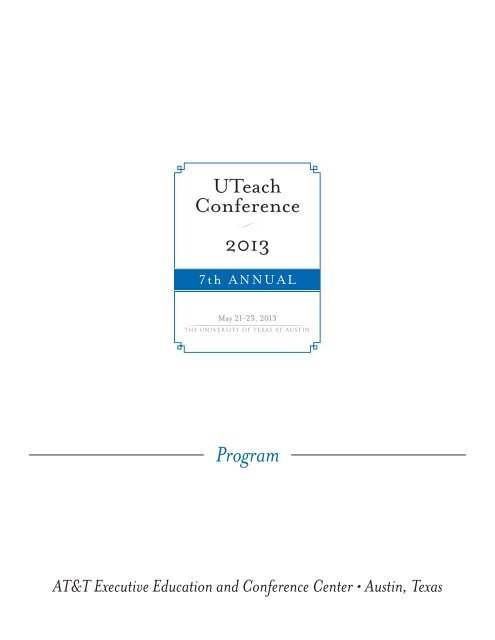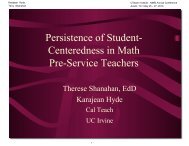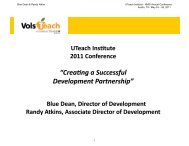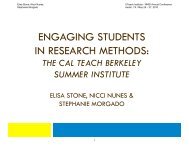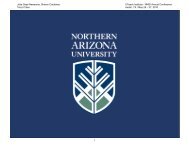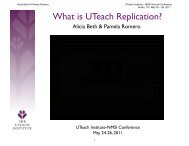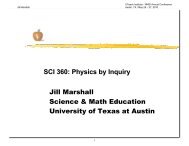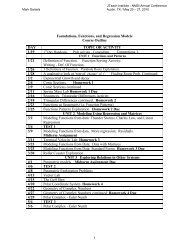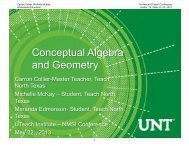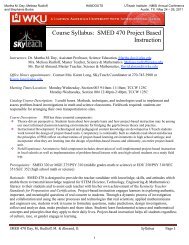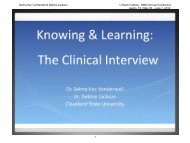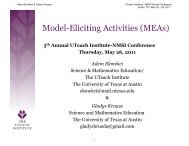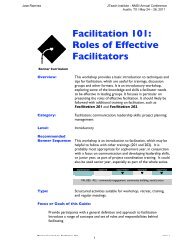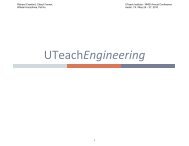Conference Program - The UTeach Institute
Conference Program - The UTeach Institute
Conference Program - The UTeach Institute
Create successful ePaper yourself
Turn your PDF publications into a flip-book with our unique Google optimized e-Paper software.
<strong>UTeach</strong><strong>Conference</strong>20137 th AnnualMay 21–23, 2013<strong>Program</strong>AT&T Executive Education and <strong>Conference</strong> Center • Austin, Texas
Featured SpeakersOpening Plenary—<strong>UTeach</strong>ers as Leaders: Stories from the FieldWhat makes a <strong>UTeach</strong> graduate unique? What inspires themto do what they do? <strong>UTeach</strong> graduates share their stories andreflect on the challenges they face and the successes they haveachieved.Jeffrey HigginbothamJeffrey Higginbotham graduated in 2011 from Florida StateUniversity with a B.S. in biological sciences and teachingthrough the FSU-Teach program. He currently teaches the highschool–level Cambridge IGCSE Biology and the college-levelCambridge A-Level Marine Science at Rockledge High School inRockledge, Florida. Because of FSU-Teach, during college Jeffreywas an intern for the education department at the TallahasseeMuseum of History and Natural Science, where he wasprimarily responsible for designing and modifying educationprograms but also helping the public better understand ecologythrough live animal encounters. He tries to make the lifesciences appeal to students by engaging them in aspects of realscience and in the way real scientists do their work.Heather HoffpauirHeather Hoffpauir earned a bachelor’s degree in mathematicswith a concentration in secondary education throughLouisiana State University in 2012. She teaches Algebra I andMath Intervention at Port Allen High School in Port Allen,Louisiana. She also is the assistant softball coach for theschool. Heather is a graduate of LSU’s GeauxTeach programand a proud mentor to current students going through theprogram. She continually uses project-based learning andinquiry-based instruction to aid students in understandingkey concepts of mathematics. Heather is a firm believer informative assessment use in the classroom to help teachersgauge their students’ level of understanding. She was featuredin a Math Collaborative Design Film Project, funded by MathSolutions and the Bill and Melinda Gates Foundation, on theeffective use of formative assessment in the classroom.Katye HowellAfter graduating in May 2012 with a degree in biology throughthe University of Texas at Austin’s <strong>UTeach</strong> program, KatyeHowell began teaching Biology and Pre-AP Biology at William B.Travis High School in the heart of Austin. <strong>The</strong>re, her enthusiasmfor learning about the world is contagious, and her passion forteaching and sharing information has earned her recognitionas Travis’s Teacher of Promise. Katye enjoys hooking her studentswith real-world applications of science and helps themunderstand the ways they experience science every single day.She ties her interests, many of which she shares with her students,into her lessons to make learning fun and engaging.Kristin WilsonWhile attending Florida State University, Kristin becameinvolved in FSU-Teach by becoming an intern. She graduatedwith a double major in mathematics and secondary educationin 2011. She currently teaches Coordinate Algebra at SalemHigh School in Conyers, Georgia, a suburb of Atlanta. At SalemHigh School, Kristin continuously implements inquiry-basedinstruction and has done argument-driven inquiry-basedlessons multiple times this school year. Her goal is to encouragemore students to go into the field of mathematics. Kristin iscurrently working on a master’s in secondary mathematicseducation at Georgia State University.Featured Speakers 3
KeynoteSara Martinez TuckerOn March 1, Sara Martinez Tucker joined the National Mathand Science Initiative as CEO. She previously served as UnderSecretary of Education in the U.S. Department of Educationfrom 2006–2008. Prior to that leadership role, she was CEOand President for nine years of the Hispanic ScholarshipFund (HSF), where she raised $280 million for scholarshipand community outreach programs to increase Hispaniccollege participation. She also previously enjoyed a 16-yearcareer with AT&T, last serving as regional vice president forAT&T’s Global Business Communications Systems.As Under Secretary, Tucker oversaw all policies andprograms related to postsecondary education, vocation,and adult education, as well as federal student aid.Tucker’s accomplishments included development andimplementation of two signature programs to increaseaccess to college: a joint initiative with the U.S. TreasuryDepartment to make nearly $70 billion in 2008–2009 federalstudent loans available during the nation’s financial crisis,and an innovative website, college.gov, to help students andfamilies prepare for college.Among her many honors, in 2005, TIME magazine namedTucker one of the 25 most influential Hispanics in the U.S.She currently serves on the board of directors of AmericanElectric Power Company, Xerox Corporation, and Teach forAmerica. She also serves on the University of Notre Dame’sBoard of Trustees and Wal-Mart’s External Advisory Council.Born and raised in Laredo, Texas, Tucker earned a bachelor’sdegree in journalism and a master’s degree in businessadministration from <strong>The</strong> University of Texas at Austin.Closing PlenaryMichael StarbirdMichael Starbird is a University Distinguished TeachingProfessor of Mathematics at <strong>The</strong> University of Texas atAustin. He has been at UT his whole career except for leaves,including as a Visiting Member of the <strong>Institute</strong> for AdvancedStudy in Princeton, New Jersey, and a member of thetechnical staff of the Jet Propulsion Laboratory in Pasadena,California.He has received more than a dozen teaching awards,including the Mathematical Association of America’s 2007national teaching award, the Texas statewide Minnie StevensPiper Professor award, the UT Regents’ Outstanding TeachingAward (in the inaugural year of the award), and many of theUT-wide teaching awards, including the Jean Holloway Awardfor Excellence in Teaching, the Friar Centennial TeachingFellowship, the Chad Oliver Plan II Teaching Award, thePresident’s Associates Teaching Excellence Award, the Dad’sAssociation Centennial Teaching Fellowship, the Eyes of TexasExcellence Award (twice), and others.Starbird is a member of UT’s Academy of DistinguishedTeachers and is an inaugural member of the UT SystemAcademy of Distinguished Teachers. He has produced DVDcourses for <strong>The</strong> Teaching Company in the Great CoursesSeries on calculus, statistics, probability, geometry, andthe joy of thinking, which have reached several hundredthousand viewers.Starbird has given hundreds of lectures and workshops. Hehas co-authored several books including several Inquiry-Based Learning textbooks and three books with co-authorEdward Burger: the innovative textbook for liberal artsstudents entitled <strong>The</strong> Heart of Mathematics: An Invitationto Effective Thinking; the general audience mathematicsbook Coincidences, Chaos, and All That Math Jazz: MakingLight of Weighty Ideas, which has been translated into eightforeign languages; and their first non-mathematics book, <strong>The</strong>5 Elements of Effective Thinking.4 Featured Speakers
Tuesday, May 21, 20138:00am—5:00pmREGISTRATION | LEVEL 21:00pm—2:45pmOPENING PLENARY | Ballroom (Salon C)UTEACHERS AS LEADERS: STORIES FROM THE FIELDModerator: Steven Zipkes, Principal, Manor New Tech High School, TexasJeffrey Higginbotham, Biology Teacher, Rockledge High School, FloridaHeather Hoffpauir, Algebra I Teacher, Port Allen High School, LouisianaKatye Howell, Biology Teacher, William B. Travis High School, TexasKristin Wilson, Mathematics Teacher, Salem High School, GeorgiaWhat makes a <strong>UTeach</strong> graduate unique? What inspires themto do what they do? <strong>UTeach</strong> graduates share their stories andreflect on the challenges they face and the successes theyhave achieved.3:00pm—4:15pmEXPLORING EXCELLENCE IN TEACHING WITH THE UTEACHOBSERVATION PROTOCOL | 101Interactive PresentationMichael Marder, Co-Director, University of Texas at AustinCandace Walkington, Professor, Southern Methodist UniversityWe will discuss recent results obtained by employing the<strong>UTeach</strong> Observation Protocol with data from the Measures ofEffective Teaching project.GET REAL WITH TEACHING SCIENCE AND ENGINEERING: ANINDUSTRY PERSPECTIVE | 102Interactive PresentationRay Hsu, Senior <strong>Program</strong> Manager, K-12 Education, National InstrumentsBrooke Wehrmann, Courseware Project Manager, National Instruments<strong>The</strong> primary goal of STEM education is to ensure thatstudents have college- and career-ready skills. NationalInstruments needs to hire hundreds of engineers each yearand has a unique perspective—that all of our customers arescientists and engineers. This session will provide an industryperspective and demonstrate new tools and curriculum forusing real-world, hands-on projects for STEM classrooms.BUILDING YOUR STUDENT ORGANIZATION | 103Interactive PresentationSumudu Lewis, <strong>Program</strong> Director, University of Massachusetts, LowellAnna Gonzalez, Master Teacher, University of Texas-Pan AmericanTim Sears, Master Teacher, University of Texas-Pan AmericanMatthew Desmond, Student, University of Massachusetts, LowellAshley Bretton, Student, University of Massachusetts, LowellKayleigh Flores, Student, University of Texas-Pan AmericanMaria Jimenez, Student, University of Texas-Pan AmericanEdgar Palomino, Student, University of Texas-Pan AmericanFrancisco Rafael Torres, Student, University of Texas-Pan AmericanJulio Carrizales, Student, University of Texas-Pan AmericanThis session is targeted for <strong>UTeach</strong> students who are beginninga <strong>UTeach</strong> student organization. A panel of students andadvisors from two universities will present their successes andchallenges in maintaining their campus organizations.WHAT IS UTEACH? | 203Interactive PresentationLarry Abraham, Co-Director, Interim Dean of the School of UndergraduateStudies, University of Texas at AustinMark Daniels, Associate Director, University of Texas at AustinThis session is for anyone interested in learning more aboutthe <strong>UTeach</strong> secondary math and science program at UTAustin. Presenters will describe the hallmarks of <strong>UTeach</strong>, itsorganizational structure at the university, the roles of keyprogram staff and faculty, and its partnership with local K-12schools. Finally, the presenters will review the program’sresults at UT Austin, including program enrollment andretention, student profiles, and teacher production andretention.USING VIDEO TO REINVENT TEACHING AND LEARNING |301Interactive PresentationRobyn Huss, Assistant Professor of Secondary Education,University of West Georgia“Flip” your classroom! Provide instruction through videosstudents watch at home, and spend class time facilitatingactive learning. <strong>The</strong> session includes whole-group discussionand small-group collaboration.SAVING TEXAS SPECIES: A BIOLOGY MODEL LESSON FORPROJECT-BASED INSTRUCTION | Salon AHands-on WorkshopKatie Donaldson, Master Teacher, University of Texas at DallasBill Neal, Master Teacher, Assistant Director, University of Texas at DallasExperience a model lesson used to introduce students toPBI. Participants are challenged to raise funds for a charity bywriting children’s books that bring awareness to the plight oflocal, endangered species.UTEACH COURSE OVERVIEW: PERSPECTIVES ON SCIENCEAND MATHEMATICS | Salon BInteractive PresentationAlberto A. Martinez, Associate Professor, Department of History,University of Texas at AustinThis session provides an introduction to Perspectives onScience and Mathematics, one of nine <strong>UTeach</strong> courses. Thiscourse fosters an understanding of the historical developmentof the fields of science and mathematics.IPAD APP BY TI-NSPIRE | Salon DHands-on WorkshopLorie Moore, Master Teacher, University of West GeorgiaAli Ayers, Master Teacher, University of West GeorgiaParticipants will use a TI-nSpire app on an iPad or handheld todo science activities for the middle grades classroom. We willdiscuss the experience of Step 1 and Step 2 students using theapps in their 5E lessons.tuesday, May 21, 2013 5
4:30pm—5:45pmRESEARCH DESIGN OPTIONS, METHODOLOGICALAPPROACHES, AND MEASURES TO EVALUATE THE EFFICACYOF THE UTEACH STEM TEACHER PREPARATION PROGRAM| 101Interactive PresentationMelissa Dodson, Evaluation Manager, SEDLLaura Costello, Research Specialist, SEDLSEDL and <strong>UTeach</strong> Austin are working with leading nationalexperts to identify and propose research design options,methodological approaches, and measures to evaluate theefficacy of the <strong>UTeach</strong> STEM teacher preparation program.In this session, SEDL will share an overview of the researchplanning grant process, the accomplishments of the planningteam, and the research priorities they identified.ENGINEER YOUR WORLD: ENGINEERING DESIGN FOR HIGHSCHOOLS | 102Interactive PresentationCheryl Farmer, <strong>Program</strong> Manager, <strong>UTeach</strong>Engineering,University of Texas at AustinEngineer Your World is a cost-effective, research-based,practical class that introduces students to what engineering is,what engineers do, and the impact of engineers on our world.GUERRILLA MARKETING | 103Hands-on WorkshopJennifer McDonald, Student Services Coordinator,University of North TexasCindy Woods, Master Teacher, University of North TexasShelby Grissett, Student, University of North TexasThis session is an in-depth look at available no-cost and lowcostprogram marketing strategies with a primary focus onrecruitment and retention.UTEACH INSTRUCTIONAL PROGRAM OVERVIEW | 203Interactive PresentationKimberly Hughes, Director, <strong>UTeach</strong> <strong>Institute</strong>This session will provide a comprehensive overview of thedesign and implementation of the <strong>UTeach</strong> model programcurriculum. Each of the <strong>UTeach</strong> courses will be discussed, aswell as the <strong>UTeach</strong> program field component.TIPS FROM A TEACHER: STRATEGIES FOR REACHING ALLSTUDENTS | 301Hands-on WorkshopAmena Mitha, Teacher, Manor High School, TexasParticipants will engage in discussion on ideas for how topique student interest with varying skill levels. <strong>The</strong>re will befive stations on strategies proven to be effective in movingstudents toward success.INNOVATIVE TECHNOLOGY FOR SCIENCE AND MATHINQUIRY | Salon AInteractive PresentationCarol Williamson, Master Teacher, University of KansasLearn about and sign up to use free, NSF-supported inquirybasedscience and math activities that use computationalmodels and real-time data acquisition from the ConcordConsortium (http://concord.org/project). Note: Bring yourown device to access the online resources in this session.INSPIRING MOTIVATION IN STUDENTS: PUTTING WHEELSON THE DRIVE TO LEARN | Salon DHands-on WorkshopLynn Kirby, Master Teacher, University of Texas at AustinGladys Krause, Teaching Assistant, University of Texas at AustinAcademic motivation? Like a piggy bank, the right tool cancrack open the students’ reservations with an outpouringof riches. This talk discusses some commonsense, but tooinfrequently employed, methods teachers can use to createa stimulating environment in which to harness the long-termdividends of student engagement.THE IMPLICATIONS OF THE MATHEMATICS TEKS 2012:IMPLEMENTATION AND ALIGNMENT | Salon ERoundtable DiscussionJacqueline Weilmuenster, Visiting Assistant Professor,University of Texas at ArlingtonTexas K-12 mathematics standards are likely to challenge stateeducators over the next several years. Comparisons with thecurrent 2006 TEKS and Common Core State Standards haveuncovered several large differences and potential gaps forstudents. This presentation will examine how <strong>UTeach</strong> coursesmight need to adapt to the changes.6:00pm—7:30pmWelcome Reception & Poster Session | Ballroom(Salon C)—Hosted by National Instruments1. WHAT’S YOUR NICHE?Course Exposition—StudentsZachary Buning, Student, Southern Polytechnic State UniversityA PBI lesson covering organismal interdependencies. Studentsconducted field studies and internet research to synthesizevarious projects to explain the vital part an organism plays inan ecosystem.2. FIREWORKS: AN EXPLOSIVE WAY TO TEACH CHEMICALREACTIONS USING PROJECT-BASED INSTRUCTIONCourse Exposition—StudentsAmanda Cook, Student, Western Kentucky UniversityShelby Overstreet, Student, Western Kentucky UniversityJennifer Cribbs, Instructor, Western Kentucky UniversityThis project-based unit, developed through the PBI course ofthe SKyTeach program, is designed to teach chemical reactionsto a high school chemistry class using fireworks.3. MOTIVATION THROUGH ENGAGEMENTCourse Exposition—StudentsChristian DeMeyer, Student, University of Colorado, Colorado SpringsJulie Baumann, Student, University of Colorado, Colorado SpringsKatheryn Ford, Student, University of Colorado, Colorado SpringsThis poster will show the differences between the engagementlevel of students in traditional classes versus an inquiry-basedclassroom, using what we have learned in our Step 1 andStep 2 lesson design and implementation.4. DIPPING YOUR TOES INTO TEACHINGCourse Exposition—StudentsOrly Garcia, Student, University of North TexasCome explore how Step 1 and Step 2 jump start you intothe profession of teaching through effective inquiry-basedstrategies and reflective practices.6 Tuesday, May 21, 2013
5. INTRODUCING QUANTUM PHYSICS IN THE HIGH SCHOOLCLASSROOMCourse Exposition—StudentsGeoffrey Hart, Student, University of HoustonExplore how the photoelectric effect was implemented for thefirst time in a physics classroom utilizing an inductive approachwith hands-on activities. Pre/post-test analysis included.6. WOMEN OF PHILOSOPHY: MATH AND SCIENCEHISTORICAL INFLUENCECourse Exposition—StudentsHannah Hintz, Student, University of North Texas<strong>The</strong> voices of influential women in philosophy, math, andscience are historically silenced. Bring their contributions intoa historically correct and inclusive curriculum and let theirvoices be heard!7. UTEACH—MORE THAN A PROGRAM (HIGH SCHOOLINTERNSHIP)Course Exposition—StudentsTerry Lam, Student, University of Texas at Austin<strong>UTeach</strong> is more than a program that simply certifies teachers.It offers opportunities to be fully emerged in the lifestyle,culture, and environment of a dedicated STEM educator.8. PEERING INTO THE STEP CLASSES: USING PEER MENTORSTO HELP PREPARE UTEACH STUDENTS TO TEACHCourse Exposition—StudentsCara MacDonald, Student, University of Texas at AustinChristopher Deyo, Student, University of Texas at AustinBeatriz Fortanely, Student, University of Texas at Austin<strong>UTeach</strong> Austin began using peer mentors in Step classes in thespring of 2011 to facilitate lesson writing and rehearsal duringclass and outside of class. Peer mentors have successfullycompleted Step 2.9. COMBATING STEREOTYPE THREAT: AN ASIAN AND ANATHLETE WALK INTO THE CLASSROOMCourse Exposition—StudentsMadilynn McCollum, Student, University of Tennessee, KnoxvilleStereotype threat is a major problem in high schools acrossAmerica. Many students perform poorly in math or sciencebecause there are negative stereotypes associated with themand that subject.10. GETTING THE BIG PICTURE WITH CONCEPTUALMATHEMATICSCourse Exposition—StudentsMichelle McKay, Student, University of North TexasCome learn how engaging conceptual mathematics leads todeep understanding and peer collaboration using academicvocabulary for learners of all ages.11. THE MATH I NEVER LEARNED: SECONDARY MATHMETHODSCourse Exposition—StudentsClaire McMahon, Student, University of North TexasAn introduction to math and teaching that shines a light onevery dark spot you and your students have in mathematics.12. CHALLENGING STUDENTS TO RISE ABOVE THECONTENT: A 5E LESSON ON CELLULAR RESPIRATION ANDFERMENTATIONCourse Exposition—StudentsMadison Moore, Student, Western Kentucky UniversityMartha Day, Co-Director, Western Kentucky UniversityThis poster will showcase a 5E lesson designed for ClassroomInteractions. Students engaged in bread-making to connectconcepts of cellular respiration and fermentation.13. CLASSROOM INTERACTIONS: BRINGING IT ALLTOGETHERCourse Exposition—StudentsMatthew Morgan, Student, University of North TexasChat with a student about teaching after completingClassroom Interactions and the impact of educational research,concrete applications, and the integration of interdisciplinarity.14. CSUTEACH PROBLEM-BASED INSTRUCTION WITHFUNCTIONS & MODELINGCourse Exposition—StudentsBrandon Profit, Student, Cleveland State UniversityPaula Riedel, Student, Cleveland State UniversityWeTeach students will share evidence of the outcomesfrom the Functions & Modeling course. Topics will includetestimonials, class activities, sample projects, and labpreparation.15. GIVE IT A TRY!Course Exposition—StudentsParvinder Singh, Student, University of Texas at ArlingtonExplore math and science teaching through the first andsecond introductory courses.16. BE AWARE OF YOUR DIVERSE LEARNERSCourse Exposition—StudentsCaitlin Young, Student, University of KansasChelsea Switts, Student, University of KansasClassroom Interactions students share their experiencesparticipating in an Equity Fair. Raise awareness in yourclassroom about diverse learners and their needs in learningmath and science.17. CU TEACH COLLABORATIVEOther—Non-CompetitiveJulie Andrew, Master Teacher, University of Colorado, BoulderKim Bunning, Master Teacher, University of Colorado, Boulder<strong>The</strong> goals of the CU Teach Collaborative are to develop a cadreof master teachers who are able to support novice teachersin their development as inquiry-oriented math and scienceteachers.18. CREATIVE STUDENT-MADE MODEL ELICITING ACTIVITIES(MEAS)Other—Non-CompetitiveMaria Benzon, Master Teacher, University of HoustonIn our Knowing and Learning course, pre-service teacherscreated challenging, real-world, and open-ended problems(i.e., MEAs) that integrate math and science standards.Exemplar MEAs will be shared.19. FOLLOWING THE YELLOW BRICK ROADOther—Non-CompetitiveMichelle Buchanan, Assistant Director, University of Arkansas at Little RockKelly Chaney, Master Teacher, University of Arkansas at Little Rock“All you do is follow the Yellow Brick Road.” UALRTeach shareshow they quickly began down the path toward the EmeraldCity and found knowledge, camaraderie, confidence, and afew flying monkeys.20. THE USE OF UNDERGRADUATE LEARNING ASSISTANTSIN INTRODUCTORY PHYSICS COURSES FOR ENGINEERINGSTUDENTSOther—Non-CompetitiveMichelle Burd, Principal, Burd’s Eye View, Research & EvaluationBeth Johnson, Evaluation Consultant, Burd’s Eye View, Research & EvaluationDescription of how paid undergraduate Learning Assistantsfacilitate student learning in an Engineering Physics course.tuesday, May 21, 2013 7
21. INSIGHTS FROM THE UTOP PILOT STUDYOther—Non-CompetitiveAudrey De Zeeuw, Student, University of Texas at AustinPaige Bauerkemper, Student, University of Texas at AustinFor the past two years, we used the UTOP in secondary mathand science classrooms. This poster shares some of thelessons learned to guide future UTOP implementation.22. LOWELL INITIATIVE SCALE LESSON OUTREACHOther—Non-CompetitiveIrene Martin, Master Teacher, University of Massachusetts, LowellLowell School District and UMass Lowell partnered topresent the concept of scale to local students. <strong>UTeach</strong>interns presented their lessons as part of their required fieldexperiences.23. THE UTEACH OUTREACH PROGRAMOther—Non-CompetitiveDrew McWhorter, Staff, University of Texas at AustinThis poster serves as an overview of the <strong>UTeach</strong> Outreachprogram. <strong>UTeach</strong> Outreach’s community initiatives areshowcased alongside their results and impact.24. PERCEIVED BENEFITS FOR MENTORS OF UTEACH STEP 1STUDENTS: A QUALITATIVE INQUIRY INTO INQUIRY-BASEDINSTRUCTIONOther—Non-CompetitiveLorie Moore, Master Teacher, University of West GeorgiaLi Cao, Associate Professor, University of West GeorgiaThis ethnographic study investigated benefits for sevenelementary teachers who mentored <strong>UTeach</strong> Step 1 students.This experience provided mentors with enhanced pedagogyand opportunities for reflection.25. THE PERFECT MATCH: PAIRING STUDENTS ANDTEACHERS IN FIELD PLACEMENTSOther—Non-CompetitiveRyan Shiba, Project Manager, University of California, BerkeleyDeborah Nolan, Co-Director, University of California, BerkeleyLearn how UC Berkeley is designing a custom-built websiteapplication to match participating students and their mentorteachers each semester with a few clicks of a button.26. CAL TEACH TRANSITIONS: SUCCESSES AND CHALLENGESDURING THE FIRST YEAR OF AN INDUCTION PROGRAMOther—Non-CompetitiveElisa Stone, <strong>Program</strong> Director, University of California, BerkeleyDeborah Nolan, Co-Director, University of California, BerkeleyGeorge Johnson, Co-Director, University of California, BerkeleyCal Teach Transitions at Berkeley has successfully supportedgraduates through a professional learning community,classroom observations and feedback, and access to additionaleducational resources.27. TIGERS LEARNING COMMUNITY<strong>Program</strong> Exposition—StudentsAlexandria Camp, Student, University of MemphisSheri Hobson, Student, University of MemphisPorsha Jenkins, Student, University of MemphisTigers Learning Community (TLC) builds peer relationshipsby providing students with a coach, an upper classman, whomentors them in their assignments, teaching, and onlinediscussions.28. UTEACH ARLINGTON<strong>Program</strong> Exposition—StudentsArthur D’Auteuil, Student, University of Texas at ArlingtonAdd teacher certification to your degree with <strong>UTeach</strong> Arlingtonand expand your career options.29. WETEACH UML<strong>Program</strong> Exposition—StudentsMatthew Desmond, Student, University of Massachusetts, LowellAshley Bretton, Student, University of Massachusetts, LowellThis poster will show the work WeTeach UML has done andwill continue to do to create a cohesive learning environmentwithin the program.30. TALON TEACH: BUILDING A WARM AND FUZZYCOMMUNITY<strong>Program</strong> Exposition—StudentsShelby Grissett, Student, University of North TexasCome learn why future math and science teachers at theUniversity of North Texas feel like family and have built lastingrelationships.31. SERVICE MINDED? THE ROLE OF A STUDENTAMBASSADOR<strong>Program</strong> Exposition—StudentsPatrick Gustafson, Student, University of North TexasHear about how serving as a student ambassador builds leadershipskills and provides multiple avenues to guide and advisefuture pre-service teachers.32. THE IMPACT OF FORMAL AND INFORMAL PRE-SERVICEEXPERIENCES ON PROFESSIONAL GROWTH<strong>Program</strong> Exposition—StudentsR. Riley Hatch, Student, University of HoustonExplore how both formal and informal experiences have influencedmy professional growth as a pre-service teacher. Internshipsand teaching assistant positions will be included.33. DEFINING A “MATH PERSON”Research—StudentsDagan Conatser, Student, Western Kentucky UniversityThis is a follow-up study surveying a sample of 131 participantsabout how they define what it means to be a “math person.”34. THE SQUARE ROOT OF nResearch—StudentsKismet Cuellar, Student, University of Texas at AustinSteve Trenfield, Student, University of Texas at AustinAn integration of algebra and geometric construction to describeand visualize the square root of n.35. CHILI TODAY OR HOT TAMALE: ENGINEERING A SOLAROVENResearch—StudentsShelton Fisher, Student, Western Kentucky UniversityMartha Day, Co-Director, Western Kentucky UniversityLester Pesterfield, Co-Director, Western Kentucky UniversityThis research investigates the engineering design process ofsolar ovens to optimize temperature and power output. Ovenconfigurations were compared to identify the best model.36. AN INVESTIGATION OF THE PROPERTIES OF AMORPHOUSAND CRYSTALLINE STRUCTURED SOLIDSResearch—StudentsTyler Harrison, Student, University of Texas at Arlington<strong>The</strong> changes in a solid’s electrical and magnetic properties areinvestigated when the atomic structure is changed from crystallineto amorphous using the melt spinning technique.37. DETERMINING AN EQUATION FOR THE RATE AT WHICHDYED HAIR LOSES COLOR IN CHLORINEResearch—StudentsBrittany Robbins, Student, University of Texas at ArlingtonHuman hair extensions, hair dye, and a spectrum of chlorinedilutions were used in order to determine an equation of rateat which the hair lost the dyed color in respect to the pH of thechlorine.8 Tuesday, May 21, 2013
Wednesday, May 22, 20138:00am—8:45amBreakfast | BALLROOM (Salon C)9:00–11:00amOpen House–<strong>UTeach</strong> FacilitiesREFER TO MAP IN CONFERENCE PACKETCollege of Natural Sciences: Painter Hall, 4th Floor9:00am—10:15amSTANDARDS FOR PREPARATION AND PROFESSIONALDEVELOPMENT FOR K-12 TEACHERS OF ENGINEERING | 101Interactive PresentationCheryl Farmer, <strong>Program</strong> Manager, <strong>UTeach</strong>Engineering,University of Texas at AustinLouis Nadelson, Co-Director, Boise State UniversityParticipants will bring a variety of perspectives to bear onassessing the effectiveness of an emerging framework fordesigning and evaluating engineering teacher developmentprograms.BUILDING A LIBRARY OF PRACTICE: THE MET EXTENSIONVIDEO COLLECTION | 102Interactive PresentationAlka Pateriya, MET Extension Project Director, WestatSteve Cantrell, Chief Research Officer, Bill and Melinda Gates FoundationThis session will provide attendees with an overview of theLibrary of Practice and how <strong>UTeach</strong> students can participatein the development of the Library, which contains over 15,000video lessons.UTEACH COURSE OVERVIEW: STEP 1 AND 2 | 103Interactive PresentationLynn Kirby, Master Teacher, University of Texas at AustinShelly Rodriguez, Clinical Assistant Professor, Master Teacher,University of Texas at AustinNita Ganguly, Master Teacher, University of Tennessee, KnoxvilleThis session will provide an introduction to the Step courses, thefirst two <strong>UTeach</strong> courses taken by students. <strong>The</strong> Step coursesprovide students with early opportunities to “try out teaching.”UTEACH COURSE OVERVIEW: KNOWING AND LEARNING INMATHEMATICS AND SCIENCE | 104Interactive PresentationWalter Stroup, Associate Professor, Department of Curriculum andInstruction, College of Education, University of Texas at AustinThis session will provide an introduction to Knowing andLearning in Mathematics and Science, one of nine <strong>UTeach</strong>courses. This course focuses on issues of what it means toknow and learn secondary science and mathematics.UKANTEACH PROGRAM GROWTH: A LOOK AT OURINNOVATIVE ADVISING AND SCHEDULING SYSTEM | 107Interactive PresentationAshley Anguiano, Advisor, University of KansasDanielle Barker, Advisor and Data Coordinator, University of KansasKU’s UKanTeach program shares tools and experiences inadvising and scheduling and how these critical elementsimpact program growth. <strong>The</strong> last 45 minutes are reserved forroundtable discussion.INTEGRATION OF TI-NSPIRE WITHIN FUNCTIONS ANDMODELING | 108Hands-on WorkshopAmin Lalani, Master Teacher, University of Texas at DallasTopics include using the Nspire as an engagement tool, helpingstudents explore mathematical concepts such as conic andsinusoidal functions, and using the Nspire for continuousformative assessment in class.WHAT’S IT TAKE TO BE A UTEACH CO-DIRECTOR? |AMPHITHEATER 204Panel DiscussionLarry Abraham, Co-Director, Interim Dean of the School of Undergraduate Studies,Professor of Kinesiology and Health Education, University of Texas at AustinStephen Addison, Co-Director, Professor in the Department of Physics andAstronomy, Interim Dean of the College of Natural Sciences and Mathematics,University of Central ArkansasAnn Cavallo, Co-Director, Professor of Curriculum and Instruction, Universityof Texas at ArlingtonAnita Greenwood, Co-Director, Dean of Education, University ofMassachusetts, LowellRamon Lopez, Co-Director, Professor of Physics, University ofTexas at ArlingtonMary Urquhart, Co-Director, Associate Professor of Science/MathematicsEducation, University of Texas at DallasAlistair Windsor, Co-Director, Assistant Professor of Mathematics, Universityof MemphisCo-directors from several universities implementing the<strong>UTeach</strong> model program discuss the work they do and thechallenges they face in building a new program on campus,fostering cross-college and university collaboration, andnavigating the rapids in the preparation of STEM teachers.THE PERFECT EDUCATION PROFESSION RéSUMé: TIPSFROM AN INSIDER | 301Hands-on WorkshopJennifer McDonald, Student Services Coordinator, University of North TexasLearn the do’s and don’ts of résumé writing from a former HRscreener. Guidelines to ensure your résumé makes it throughthe screening process and tips to get your résumé placedahead of others.OPTIMIZING UTEACH FOR POST-BACCALAUREATECANDIDATES | Salon ARoundtable DiscussionKimberly Hughes, Director, <strong>UTeach</strong> <strong>Institute</strong>Join a roundtable discussion about the unique need andqualities of post-baccalaureate teaching candidates and howthe existing <strong>UTeach</strong> post-bac pathway might be redesigned tobetter meet their needs.HOW CAN UTEACH ONLINE? | Salon BRoundtable DiscussionPatrick McGuire, Assistant Professor, University of Colorado,Colorado SpringsJason DaLee, Master Teacher, University of Colorado, Colorado SpringsRobert Gagnon, Master Teacher, University of Colorado, Colorado SpringsThis session explores ways that <strong>UTeach</strong> replication sites canproactively prepare our teacher candidates to deliver highqualitysecondary mathematics and science instruction inonline learning environments.wednesday, May 22, 2013 9
10:30am—11:45amFLORIDA STEM TEACHER INDUCTION & PROFESSIONALSUPPORT (TIPS) INITIATIVE: BUILDING, SHARING, ANDGROWING | 101Interactive PresentationGriff Jones, PI for the STEM TIPS Project, University of FloridaTom Dana, Co-PI for the STEM TIPS Project, Associate Dean, University of FloridaJason Arnold, Learning Systems Architect, University of FloridaFollow our journey through logic models, needs assessments,and technical difficulties, as we build an online inductionmodel to support districts in developing and retaining newSTEM teachers and coaches.BUDGETING FOR PROGRAM SUSTAINABILITY | 102Interactive PresentationMichael Marder, Co-Director, University of Texas at AustinAmy Chavez, Financial Analyst, <strong>UTeach</strong> <strong>Institute</strong>This session will discuss strategies related to the transitionfrom grant funding to a more permanent budget. Co-directorsfrom universities that have finished implementation willshare some of their experiences, challenges, and advice onsustainability.UTEACH COURSE OVERVIEW: CLASSROOM INTERACTIONS| 103Interactive PresentationJill Marshall, Associate Professor, Department of Curriculum and Instruction,College of Education, University of Texas at AustinThis session will provide an overview of Classroom Interactions,one of nine <strong>UTeach</strong> courses. This course continues the processof preparing students to teach mathematics and science insecondary settings by providing opportunities to see howtheories explored in the Knowing and Learning in Mathematicsand Science course play out in instructional settings.EFFECTIVE TEACHING BEGINS WITH YOU: HOWCLASSROOM MANAGEMENT CAN BE FUN AND EASY (OR ATLEAST EASIER!) | 104Interactive PresentationScott Fray, Master Teacher, Clinical Faculty, Northern Arizona UniversityLynn Kirby, Master Teacher, Clinical Faculty, University of Texas at AustinBased on Teaching with Love and Logic, the session beginswith a demo lesson from Classroom Interactions as taught atNorthern Arizona University. Role-playing scenarios to practicestrategies will follow.USING A TUNING PROTOCOL TO ANALYZE LESSON PLANS INTHE APPRENTICE TEACHING SEMINAR | 107Interactive PresentationMarlene Hilkowitz, Master Teacher, Temple UniversityThis interactive session will present and discuss howapprentice teachers became critical analysts of their lessonplans through the use of the Tuning Protocol process for eightsessions of an AT weekly seminar.INCREASING THE POTENTIAL OF PHYSICS AND CHEMISTRYTEACHERS IN TEACHHOUSTON | 108Interactive PresentationPaige Evans, Clinical Associate Professor, University of HoustonR. Riley Hatch, Student, University of HoustonGeoffrey Hart, Student, University of HoustonThis session shows how the teachHOUSTON program at theUniversity of Houston increased the number of physics andchemistry majors/minors through recruiting, degree plans,internships, and the Noyce Scholarship <strong>Program</strong>.STUDENT SERVICES AND SUPPORT PANEL | 203Roundtable DiscussionModerator: Ashley Welch, Manager of Site Support, <strong>UTeach</strong> <strong>Institute</strong>Kim Distin, <strong>Program</strong> Director and Materials Manager, University of Texasat DallasAvalon Gourlay, Assessment Coordinator and Academic Advisor, University ofTennessee, ChattanoogaAnnette Hairston, Academic Advising Coordinator, University of Texas at AustinJada Johnson, VolsTeach Academic Coach/Recruiter, Center for EnhancingEducation of Math and Sciences, University of Tennessee, KnoxvilleLindsey Robinson, <strong>Program</strong> Coordinator, University of West Georgia<strong>Program</strong> support staff and advisors will share their experiencesand discuss with the audience ways to support <strong>UTeach</strong>students and student-related activities in a new and fastgrowingprogram.WHAT IS UTEACH REPLICATION? | AMPHITHEATER 204Interactive PresentationKimberly Hughes, Director, <strong>UTeach</strong> <strong>Institute</strong>Steve Case, Co-Director, Director of the KU Center for Science Education,University of Kansas<strong>The</strong> <strong>UTeach</strong> <strong>Institute</strong> has developed a comprehensive approachto supporting the replication of <strong>UTeach</strong> at partnering universitysites. This session provides an overview of the <strong>Institute</strong>’sproducts and services, including site selection, communicationof the <strong>UTeach</strong> model, operational and instructional support,evaluation services, and networking and communitybuilding opportunities. Participants will learn about theproposal process and selection criteria, initiating a <strong>UTeach</strong>program, planning and budgeting for a <strong>UTeach</strong> program, andexpectations for program rollout and course fidelity.. . . AND MODELING | Salon AHands On WorkshopSteven Obenhaus, Master Teacher, University of KansasMathematical Modeling is a bridge between the Common CoreState Standards for Mathematics and the Next GenerationScience Standards. Participate in three data modelingactivities from the UKanTeach Functions and Modeling course.Connections to national standards and Research Methods willbe discussed.EXPANDING UTEACH TO COMMUNITY COLLEGES ANDSATELLITE CAMPUSES | Salon BRoundtable DiscussionMartha M. Day, Co-Director, Western Kentucky UniversitySharon Faye Cardenas, Associate Director, Northern Arizona UniversityBrett Westbrook, Senior Student Affairs Administrator, University of Texasat AustinSeveral universities implementing <strong>UTeach</strong> face a need to workwith local community colleges and/or satellite campuses.During this roundtable discussion, representatives from four<strong>UTeach</strong> programs lead a discussion of the need and proposedsolutions for expanding <strong>UTeach</strong> program implementation toother campuses.10 Wednesday, May 22, 2013
11:45am—12:45pmLunch | TEJAS DINING Room1:00pm—2:15pmHIGHLIGHTS: NATIONAL UTEACH PROGRAM REPLICATION| 102Interactive PresentationPamela Romero, Associate Director, <strong>UTeach</strong> <strong>Institute</strong>Mary Lummus-Robinson, Data Coordinator, <strong>UTeach</strong> <strong>Institute</strong>Martha Perez, Data Coordinator, <strong>UTeach</strong> <strong>Institute</strong>Marty Evans, Evaluation Coordinator, <strong>UTeach</strong> <strong>Institute</strong>To date, 35 universities have received grants to replicate the<strong>UTeach</strong> program. This session highlights implementationresults, including student recruitment and enrollment,demographics, student satisfaction, and courses implemented.For programs that have implemented <strong>UTeach</strong> for four or moreyears, this session summarizes evaluation results that examinethe extent to which these have aligned to the <strong>UTeach</strong> modelElements of Success.UTEACH ENGINEERING? | 103Interactive PresentationDavid Kazmer, Professor and Co-Director (Engineering), University ofMassachusetts, LowellCecelia Wigal, Assistant Dean of Engineering and Computer Science, Universityof Tennessee, ChattanoogaLouis Nadelson, Co-Director, Boise State UniversityCheryl Farmer, <strong>Program</strong> Manager, <strong>UTeach</strong> Engineering, University of Texasat AustinThink-pair-share about 1) How is teaching engineeringdifferent from teaching science? 2) How does engineeringteacher prep differ from teacher prep in other STEM majors?3) Are there any issues unique to <strong>UTeach</strong> Engineering studentsand content?UTEACH COURSE OVERVIEW: RESEARCH METHODS | 104Interactive PresentationMichael Marder, Co-Director, University of Texas at AustinThis session will provide an introduction to Research Methods,one of nine <strong>UTeach</strong> courses. This course engages futureteachers in a series of independent scientific inquiries.WHAT MORE DO I NEED? HOW TO MANAGE ALL THATSTUFF | 107Interactive PresentationKristin Sherman, Master Teacher, University of North TexasTeach North Texas, like other <strong>UTeach</strong> replication sites, hasreceived generous funding from grant sources such as NMSIand has purchased a large quantity of materials for studentsto use in their field experience, many resources that studentscan use for lesson planning, and other equipment usedin courses such as Functions and Modeling and ResearchMethods. So how do we manage all of this stuff with verylittle loss? What processes do we have in place to ensurestudent responsibility? Can this be done electronically? All ofthese questions and more will be answered in this informativesession for sites that are either just beginning or in the earlyyears of replication.K-12 INTERNSHIPS ON A UNIVERSITY CAMPUS: TEACHINGLABS TO HOMESCHOOLERS | 108Interactive PresentationKimberly Shaw, Co-Director, Columbus State UniversityTimothy Jones, Intern, Columbus State UniversityChloe Chambers, Intern, Columbus State UniversityGail Sinkule, Master Teacher, Columbus State UniversityThis session discusses the development of an internshipprogram serving local homeschool students, describinghow the internships were initiated. Interns will interactivelydemonstrate lessons from their lab classes.SUPPORTING NEW TEACHERS: INDUCTION PANEL |AMPHITHEATER 204Panel DiscussionKelli Allen, Clinical Assistant Professor, Master Teacher, University of Texasat AustinNatasha Weissmiller, Mathematics Teacher, Del Valle High School, TexasWai (William) Chan, Science Teacher, William P. Clements High School, TexasJennifer Lazare, Science Teacher, Anderson High School, TexasWhat kind of support do new teachers need and value fromtheir preparation programs? <strong>UTeach</strong> graduates reflect on theirexperiences as first- and second-year teachers.CONCEPTUAL ALGEBRA AND GEOMETRY | Salon AHands-on WorkshopCarron Collier, Master Teacher, University of North TexasMichelle McKay, Student, University of North TexasMaranda Edmonson, Student, University of North TexasConceptual Algebra and Geometry inquiry-based teachersneed to experience being inquiry-based learners. Participantswill receive a course overview as well as engage in keyactivities included in the course.ESTABLISHING A PROFESSIONAL ASSOCIATION FOR UTEACH| Salon BInteractive PresentationJulia O’Donnell, Professional Association Coordinator, <strong>UTeach</strong> <strong>Institute</strong>Ellen Granger, Co-Director, Florida State UniversityKimberly Hughes, Director, <strong>UTeach</strong> <strong>Institute</strong>This session will provide an overview of the plan to establisha national professional network for all <strong>UTeach</strong> programsand report on recent progress. Additionally, this session willpreview a new system for tracking <strong>UTeach</strong> graduates on anational level.2:30pm—3:45pmNEXT GENERATION SCIENCE STANDARDS: IMPACT ON PRE-SERVICE TEACHER PREPARATION AND IN-SERVICE TEACHERPROFESSIONAL DEVELOPMENT | 101Interactive PresentationRamon Lopez, Co-Director, University of Texas at ArlingtonKaren Ostlund, President, National Science Teachers AssociationImplications for the Next Generation Science Standardson pre-service teacher preparation and in-service teacherprofessional development will be discussed.wednesday, May 22, 2013 1
RECONCEPTUALIZING PROFESSIONAL LEARNING FORMENTOR TEACHERS | 102Interactive PresentationShelly Rodriguez, Clinical Assistant Professor, University of Texas at AustinFindings from a recent study on mentor teacher learning willbe presented. Session participants will discuss implicationsfor the <strong>UTeach</strong> program and work together to reconceptualizementor teacher interactions.ADAPTING A STEM TEACHER PREPARATION PROGRAM FORCONTEXT AND CULTURAL RESONANCE | 103Interactive PresentationSteven Greenstein, Assistant Professor, Montclair State UniversityFaculty from the University of the Virgin Islands will present amodel of a contextually and culturally resonant pedagogy thatis meant to inform the design of our <strong>UTeach</strong> adaptation andthen discuss with participants how it might be useful.UTEACH COURSE OVERVIEW: PROJECT-BASEDINSTRUCTION | 104Interactive PresentationJill Marshall, Associate Professor, Department of Curriculum and Instruction,College of Education, University of Texas at AustinTony Petrosino, Associate Professor, Department of Curriculum andInstruction, College of Education, University of Texas at AustinThis session will provide an overview of Project-BasedInstruction, one of nine <strong>UTeach</strong> courses. This course focuseson developing problem- and project-based units of instruction.PERSPECTIVES ON MATHEMATICS AND SCIENCE: SCIENTIFICTHEORIES AND THE ROLE OF MODELS IN SCIENCE | 107Hands-on WorkshopSumudu Lewis, <strong>Program</strong> Director, University of Massachusetts, LowellIn this workshop, participants will be led through a lessonused for teaching Perspectives on Science and Mathematics,exploring the terms “theory” and “hypothesis” using models.REAL WORLD, HERE WE COME: APPRENTICE TEACHINGAND INDUCTION THE TEACH NORTH TEXAS WAY! | 108Roundtable DiscussionBecky Osborne, Master Teacher, University of North TexasTeresa Walls, Master Teacher, Lecturer, University of North TexasFollow the Teach North Texas journey from apprenticeteaching through certification, job search, and supportthrough induction. Share our bumps, lumps, and successesand come prepared to share yours, too!RECRUITMENT AND MARKETING | 203Interactive PresentationJohn Rice, Marketing Consultant, CommonSense CommunicationsCourtney J. Nudell, Student Services Coordinator, Cleveland State UniversitySteve Case, Co-Director, Director of the KU Center for Science Education,University of KansasTom Nelson, Dean of Arts and Sciences and Professor of Biology, SouthernPolytechnic State UniversityJan Smith, Master Teacher, Boise State UniversityA panel of representatives from <strong>UTeach</strong> sites, representingvarious cohorts, will discuss their recruitment and marketingstrategies with a marketing expert, John Rice. John hasworked with <strong>UTeach</strong> sites and other university STEM-focusedprograms to improve their marketing messages and strategies.SUSTAINING YOUR UTEACH PROGRAM WITH PRIVATESUPPORT | AMPHITHEATER 204Panel DiscussionPriscilla Cortez, Director of Development, Rio Grande Valley Initiative, Universityof Texas SystemSpencer Sealy, Associate Vice President for Development, Columbus StateUniversityAnn Pomykal, Director, TI FoundationAndy Greenawalt, Co-Chair, <strong>UTeach</strong> Task Force, College of Natural SciencesAdvisory Board, University of Texas at AustinThis session will discuss the importance of private fundraisingto support the sustainability of <strong>UTeach</strong> programs. <strong>The</strong>presenters in this session include individual, corporate,and foundation donors to the <strong>UTeach</strong> program as well asdevelopment representatives from <strong>UTeach</strong> replication sites.Donors will discuss what motivated their gift and provideinsight into their expectations when providing support.Replication sites will discuss their successes and challengesrelated to fundraising for various components of theirprograms.4:00pm—5:15pmPROJECT-BASED INSTRUCTION: FROM THEORY TOPRACTICE | 101Interactive PresentationTara Craig, STEM Education Doctoral Student, University of Texas at AustinProject-based instruction sounds great, but what does it looklike in a “real” classroom? A project-based instruction mathteacher will share her journey from <strong>UTeach</strong> student in the PBIcourse, to using PBI in her classroom, to teaching PBI to preserviceteachers. She will discuss the essential criteria of PBIand how to design projects that meet these criteria. She willalso provide examples of projects used in a public high schoolclassroom.PREPARING COMPOSITE SCIENCE CERTIFICATIONSTUDENTS TO TEACH PHYSICS | 102Interactive PresentationJill Marshall, Co-Director, University of Texas at AustinKaren Matsler, Master Teacher, University of Texas at ArlingtonThis session examines how <strong>UTeach</strong> composite sciencecertification graduates are prepared to teach physics. We willreport results of a pilot study and begin a discussion reviewingthe composite certification policy.RECRUITMENT, TRAINING, AND RETENTION OF MENTORTEACHERS | 103Roundtable DiscussionJason DaLee, Master Teacher, University of Colorado, Colorado SpringsVickie Newkirk, <strong>Program</strong> Coordinator, University of Colorado,Colorado SpringsMentor teachers play a significant role in preparing pre-serviceteachers during field experiences. Recruiting, training, andretaining quality inquiry-based mentors is key to programsuccess. How do we do this?UTEACH CO-DIRECTORS SPECIAL INTEREST GROUP | 104Roundtable Discussion<strong>Program</strong> co-directors, college deans, and other universityleaders will convene to discuss topics of interest to the group.12 Wednesday, May 22, 2013
EXPLORING STEP 1 LESSONS FOR ENGLISH LANGUAGELEARNERS | 107Interactive PresentationCindy Woods, Master Teacher, University of North TexasRossana Boyd, Director, Bilingual/ESL Certification <strong>Program</strong>, University ofNorth TexasNancy Terry, Master Teacher, University of North TexasTeach North Texas partners with Project NEXUS to strengthenteacher preparation to support English Language Learners.This session features TNT’s pre-written Step 1 lessons andsupporting supplemental materials.UTEACH GRADUATES ROUNDTABLE (RESTRICTED TOCURRENT UTEACH STUDENTS) | 108Roundtable DiscussionModerator: Carrie Culpepper, Professional Development Manager,University of Texas at AustinNikki Morgan, Science Teacher, Lake Travis High School, TexasMichelle Rothermel, Mathematics Teacher, Birdville High School, TexasJoshua Klaus, Science Teacher, Kirby Hall Middle and High School, TexasLouisa Torrance, Science Teacher, Lamar Middle School, TexasJeffrey Higginbotham, Biology Teacher, Rockledge High School, FloridaEverything you’ve wanted to know about life after <strong>UTeach</strong> buthave been afraid to ask. At least in front of your instructors.<strong>UTeach</strong> grads will answer questions regarding finding a job,getting through the first two years, the realities of teachingusing diverse instructional styles in the “real world,” etc.DEVELOPMENT SPECIAL INTEREST GROUP MEETING | 203Roundtable DiscussionAaron Smith, Site Coordinator, <strong>UTeach</strong> <strong>Institute</strong>Mike DeGraff, Site Coordinator, <strong>UTeach</strong> <strong>Institute</strong><strong>The</strong> <strong>UTeach</strong> <strong>Institute</strong> will give a brief overview of thedevelopment resources it provides and fundraising techniquesthat <strong>UTeach</strong> Austin has found to be successful. Attendees will beprompted to discuss ways to work collaboratively to raise money.UNIVERSITY REPLICATION PANEL: LESSONS LEARNED |AMPHITHEATER 204Panel DiscussionMartha Day, Co-Director, Executive Director of GSKyTeach, Assistant Professorof Science Education, Western Kentucky UniversityMatthew Wigglesworth, Master Teacher, Boise State UniversityKelly Chaney, Master Teacher, University of Arkansas at Little RockStephen Addison, Co-Director, Professor in the Department of Physics andAstronomy, Interim Dean of the College of Natural Sciences, University ofCentral ArkansasGail Marshall, Co-Director, Lecturer in the Department of Leadership andInstruction, University of West GeorgiaDeb Nolan, Co-Director, Professor, Department of Statistics, Universityof California, BerkeleyThis panel brings together colleagues from <strong>UTeach</strong> partneruniversities (co-directors, faculty members, master teachers)to discuss lessons learned while implementing a <strong>UTeach</strong> modelprogram. Panel members will discuss student recruitment,institutional support, implementing courses, field placements,working with colleagues in other departments, and fundraising.6:00pm—9:00pmReception and Dinner hosted by ExxonMobilCorporation | BallroomKEYNOTE SPEAKER: SARA MARTINEZ TUCKER, CEO OF THE NATIONAL MATH+ SCIENCE INITIATIVEThursday, May 23, 20138:00am—8:45amBreakfast | Tejas Dining RoomFLORIDA REPLICATION SITES BREAKFAST MEETING(CLOSED) | 103Aaron Smith, Site Coordinator, <strong>UTeach</strong> <strong>Institute</strong>This is a closed session for current Florida replication sites andwill focus on topics of interest and relevant updates.GEORGIA REPLICATION SITES BREAKFAST MEETING(CLOSED) | 104Mike DeGraff, Site Coordinator, <strong>UTeach</strong> <strong>Institute</strong>This is a closed session for current Georgia replication sites andwill focus on topics of interest and relevant updates.TENNESSEE REPLICATION SITES BREAKFAST MEETING(CLOSED) | 107Ashley Welch, Manager of Site Support, <strong>UTeach</strong> <strong>Institute</strong>This is a closed session for current Tennessee replication sitesand will focus on topics of interest and relevant updates.ARKANSAS REPLICATION SITES BREAKFAST MEETING(CLOSED) | 108Amy Moreland, Site Coordinator, <strong>UTeach</strong> <strong>Institute</strong>This is a closed session for current Arkansas replication sitesand will focus on topics of interest and relevant updates.TEXAS REPLICATION SITES BREAKFAST MEETING(CLOSED) | 301Tracie Barrs Ellis, Site Coordinator, <strong>UTeach</strong> <strong>Institute</strong>This is a closed session for current Texas replication sites andwill focus on topics of interest and relevant updates.9:00am—10:15amCLOSING PLENARY | AMPHITHEATER 204MICHAEL STARBIRD ON TEACHING EFFECTIVE THINKING<strong>The</strong> root of success in everything from academics to businessto leadership to personal relationships and everything else iseffective thinking—whether it’s thinking disguised as intuitionor as good values or as decision-making or problem solvingor creativity, it’s all thinking. Practical methods of effectivethinking can be described, taught, and learned. <strong>The</strong>y arenot inborn gifts of a special few. All students can learn themand use them. Teaching effective thinking is the central goalof education. This talk will describe practical, memorableelements of effective thinking and how to teach them.10:30am—11:45amUTEACH AND THE COMMON CORE | 102Interactive PresentationKatrina Miller, Director, First to the Top, Tennessee Higher EducationCommissionVictoria Harpool, <strong>Program</strong> Coordinator, First to the Top, Tennessee HigherEducation CommissionThis session will focus on Tennessee’s efforts at implementingWednesday–Thursday, May 22–23, 2013 13
the Common Core State Standards into the teacher trainingprogram curriculum. As Tennessee has four <strong>UTeach</strong> replicationsites, particular attention will be paid to implementation inlight of the <strong>UTeach</strong> curriculum.UTEACH COURSE OVERVIEW: APPRENTICE TEACHING | 103Interactive PresentationKelli Allen, Clinical Assistant Professor, Master Teacher, University of Texasat AustinThis session will provide an overview of Apprentice Teaching,the final of nine <strong>UTeach</strong> courses. This course provides the finalclinical preparation before <strong>UTeach</strong> students are recommendedfor certification.INTEGRATING ENGINEERING INTO YOUR UTEACH COURSES| 104Hands-on WorkshopCheryl Farmer, <strong>Program</strong> Manager, <strong>UTeach</strong> Engineering, University of Texasat AustinShelly Rodriguez, Clinical Assistant Professor, University of Texas at AustinJill Marshall, Associate Professor, Department of Curriculum and Instruction,College of Education, University of Texas at AustinJoin us for a collaborative work session to discover ways tointegrate engineering into current <strong>UTeach</strong> course activities.Please bring a lesson that shows promise for an engineeringapproach.2013 UTEACH RFP | AMPHITHEATER 204Interactive Presentation<strong>UTeach</strong> <strong>Institute</strong> Staff and Partner <strong>Program</strong> RepresentativesThis is a “don’t miss” session for participants interested insubmitting a proposal in response to the National <strong>UTeach</strong> RFP.<strong>UTeach</strong> <strong>Institute</strong> staff and representatives from <strong>UTeach</strong> partnerprograms will be available to answer questions about everyaspect of implementing a <strong>UTeach</strong> program on your campus.11:45am—12:30pmLunch | TEJAS DINING Room1:00pmAdjournUTEACH COURSE OVERVIEW: FUNCTIONS AND MODELING| 107Interactive PresentationMark Daniels, Associate Director, Clinical Professor of Mathematics, Universityof Texas at AustinThis session will provide an introduction to Functionsand Modeling, one of nine <strong>UTeach</strong> courses. In this course,students engage in explorations and lab activities designed tostrengthen and expand their knowledge of the topics found insecondary mathematics.SHOULD UTEACH ELEMENTARY? WE THINK SO! | 108Roundtable DiscussionPatrick McGuire, Co-Director, University of Colorado, Colorado SpringsRobert Gagnon, Master Teacher, University of Colorado, Colorado SpringsJason DaLee, Master Teacher, University of Colorado, Colorado SpringsCatherine Kelly, Faculty, University of Colorado, Colorado SpringsJoin us for a timely and engaging roundtable discussion thatwill explore the possibility of extending the <strong>UTeach</strong> replicationmodel to the elementary grade levels (preschool–6).MARKET YOUR BEST SELF: INTERVIEW TECHNIQUES FORFUTURE TEACHERS | 301Interactive PresentationLisa Napper, Executive Director of Human Resources, Leander IndependentSchool District, TexasCharles Little, Principal, Vandegrift High School, Leander Independent SchoolDistrict, TexasDenise Ekberg, Clinical Assistant Professor, University of Texas at AustinThis workshop is designed for <strong>UTeach</strong> students. <strong>The</strong> objectiveis to assist session participants with crafting responses tocommon teacher interview questions. Students will also learnjob search and interview etiquette and tips for how theyshould present themselves to school districts and potentialemployers.14 Thursday, May 23, 2013


